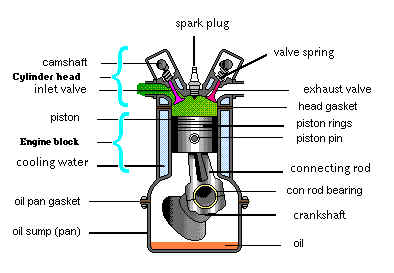The term spark ignition is used to describe the system with which the
air-fuel mixture inside the combustion chamber of an internal
combustion engine is ignited by a spark.
It is a process that uses an electrical field induced in a magneto or coil. The field builds to many thousands of volts and then is collapsed via a timed circuit. The resulting surge of current travels along a wire and terminates at the spark plug inside the combustion chamber. An electrical spark occurs as the charge tries to jump the precision gap at the tip of the spark plug at exactly the moment a precisely metered mixture of fuel and air has been thoroughly compressed in the combustion chamber. The resulting controlled explosion delivers the power to turn the reciprocating mass inside the engine.
It is a process that uses an electrical field induced in a magneto or coil. The field builds to many thousands of volts and then is collapsed via a timed circuit. The resulting surge of current travels along a wire and terminates at the spark plug inside the combustion chamber. An electrical spark occurs as the charge tries to jump the precision gap at the tip of the spark plug at exactly the moment a precisely metered mixture of fuel and air has been thoroughly compressed in the combustion chamber. The resulting controlled explosion delivers the power to turn the reciprocating mass inside the engine.
Fuels
Spark-ignition engines are commonly referred to as "gasoline engines" in America, and "petrol engines" in Britain and the rest of the world. However, these terms are not preferred, since spark-ignition engines can (and increasingly are) run on fuels other than petrol/gasoline, such as autogas (LPG), methanol, ethanol, bioethanol, compressed natural gas (CNG), hydrogen, and (in drag racing) nitromethane.Working cycle
A four-stroke spark-ignition engine is an Otto cycle engine. It consists of following four strokes: suction or intake stroke, compression stroke, expansion or power stroke, exhaust stroke. Each stroke consists of 180 degree rotation of crankshaft rotation and hence a four-stroke cycle is completed through 720 degree of crank rotation. Thus for one complete cycle there is only one power stroke while the crankshaft turns by two revolutions.



No comments:
Post a Comment